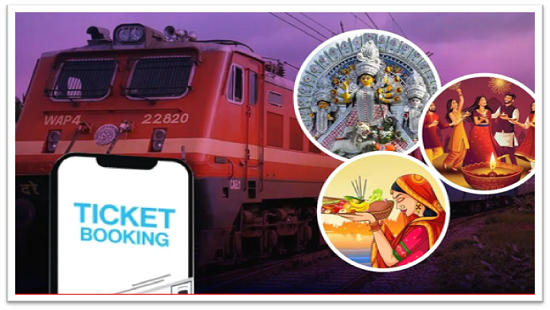
Diwali, Chhath Puja 2025: Indian Railways Rolls Out New Ticketing Rules, Discounts & Safety Measures
As India’s grand festive season approaches — marked by Diwali, Chhath Puja, and Dhanteras — the Indian Railways has unveiled a series of travel reforms and passenger-friendly initiatives to handle the surge in festive travel. These measures combine digital innovation, safety enforcement, and customer-centric planning, signalling the institution’s evolving vision of modern public service.
Each year, more than 20 million passengers rely on Indian Railways during the festive period. Recognizing this enormous demand, the new policies aim to enhance passenger safety, prevent overcrowding, and encourage digital transparency — ensuring that India’s journey home for the holidays remains efficient and joyful.
Managing the Festive Rush: Temporary Platform Ticket Restrictions
To maintain safety and manage heavy footfall at key stations, the sale of platform tickets has been temporarily suspended across select stations in Delhi, Mumbai, and Gujarat until the end of October 2025.
• Delhi-NCR: Platform ticket sales are suspended from October 15–28 at New Delhi, Delhi Junction, Hazrat Nizamuddin, Anand Vihar Terminal, and Ghaziabad.
• Mumbai Metropolitan Region: Western Railway has imposed similar curbs at Bandra Terminus (Oct 15–31), while Central Railway extended restrictions to major hubs like CSMT, Dadar, LTT, Thane, Kalyan, and Panvel from October 16–28.
• Gujarat: Stations at Vapi, Surat, and Udhna will also remain under restriction until October 31, 2025.
While the move may cause temporary inconvenience, it reflects a proactive crowd-control strategy — critical during a season when passenger movement spikes by nearly 25–30% nationwide.
Prioritizing Safety: Ban on Firecrackers and Flammable Items
In alignment with its “Zero Accident Mission,” the Railways has reiterated its long-standing prohibition on carrying firecrackers, gas cylinders, stoves, petrol, diesel, or matchboxes on trains. This comes as a seasonal advisory for passengers to ensure safe travel during Diwali and Chhath Puja.
The Ministry of Railways emphasized that violators may face up to three years in prison or a fine of ₹1,000, underlining the seriousness of the rule. The campaign is not punitive but preventive — aimed at eliminating fire hazards and protecting both passengers and property across India’s vast rail network of 7,000+ stations.
These advisories form part of a larger effort to strengthen risk awareness and behavioural safety among passengers, reinforcing that festive joy should never come at the cost of public safety.
Rationalized Reservations: 60-Day Advance Booking Window
The Advance Reservation Period (ARP) for train tickets remains capped at 60 days, a change introduced in late 2024 to curb speculative bookings and improve system efficiency.
For instance, if a passenger plans to travel on November 15, bookings will open at 12:20 a.m. on September 16. However, to avoid server congestion, platforms such as BookMyTrain.com will temporarily restrict access between 8 a.m. and 12 p.m. on the opening day.
By shortening the window from 120 to 60 days, Indian Railways aims to improve ticket turnover, reduce cancellations, and ensure that available seats serve genuine travellers — a move aligned with modern transport booking practices worldwide.
Digital Governance: Aadhaar-Based Authentication for Ticketing
The digital transformation of Indian Railways continues with its latest mandate for Aadhaar-linked IRCTC accounts. Starting October 1, 2025, users without Aadhaar validation will be unable to book tickets during the first 15 minutes of the opening window — the period when demand is typically highest.
In addition, Tatkal ticketing has undergone major reforms:
• Aadhaar Verification: From July 15, 2025, online and PRS counter bookings require OTP-based Aadhaar authentication.
• Agent Restrictions: Authorized booking agents are barred from making Tatkal reservations in the first 30 minutes of the opening — from 10:00–10:30 a.m. (AC) and 11:00–11:30 a.m. (Non-AC).
These steps promote transparency and reduce instances of bulk or fraudulent bookings, ensuring fair access for individual passengers. The shift toward Aadhaar authentication also reflects the Railways’ commitment to data-driven governance, aligning with India’s broader Digital Public Infrastructure (DPI) goals.
The Festival Round Trip Scheme: A 20% Discount on Return Fares
Perhaps the most traveller-friendly initiative this year is the Festival Round Trip Scheme, which offers a 20% discount on the base fare of return tickets — a welcome relief for families heading home during the holidays.
Scheme Highlights:
• Applicable for both onward and return bookings made for the same passenger, class, and route.
• Valid for journeys between October 13–26 (onward) and November 17–December 1 (return).
• Tickets must be booked via the same mode (either online via IRCTC or at PRS counters).
• Only confirmed tickets qualify; RAC or waitlisted bookings are excluded.
The rebate is automatically applied at the time of booking the return journey, incentivizing travellers to plan their trips in advance. By staggering passenger flow over weeks, this initiative also helps Indian Railways manage capacity utilization more effectively while rewarding customer loyalty.
A Thoughtful Balance: Safety, Digitalization, and Passenger Ease
The Indian Railways’ festive strategy for 2025 exemplifies a fine balance between efficiency and empathy. Every measure — from restricting platform tickets to mandating digital verification — is designed to ensure a safer, smarter, and more transparent travel experience.
India’s rail network carries over 23 million passengers daily, connecting cities, villages, and generations. As Diwali and Chhath Puja draw millions home, these new measures serve as a reminder of how the Railways continues to modernize while upholding its deep social mission — to keep India moving, together and safely.
The reforms also reflect an important cultural shift: one where technology meets tradition, enabling seamless journeys during the country’s most cherished festivals. In this new era of governance, Indian Railways is not merely a transporter of people — it is a conductor of national connection, trust, and renewal.


